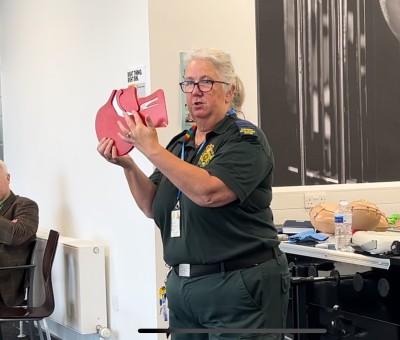North East Ambulance Service (NEAS) is supporting Restart a Heart Day, a global initiative 
Restart a Heart Day takes place each year on 16 October and aims to increase public awareness of early intervention for cardiac arrests as well as increase the number of people trained in lifesaving CPR.
In the last year, NEAS community resuscitation officers have trained just under 3,500 staff, college and school students, businesses and community groups across the North East.
Cardiac arrest can strike anybody at any time in any place, and every minute without CPR and defibrillation reduces the chance of survival by 10%. On average, NEAS health advisors support around 16,000 callers to give CPR over the phone each year.
Millions of people in the UK won’t have had the opportunity to learn this key lifesaving skill – putting lives at risk. Over 30,000 people suffer a cardiac arrest out of hospital in the UK every year, with less than one in 10 people surviving.
Alex Mason, community development officer at the Trust, said: “Anyone can be affected by a sudden cardiac arrest at any time. It’s important to quickly call 999, perform CPR and use a defibrillator. The earlier we act when someone is having a cardiac arrest, the better a person’s chance of surviving.
“For an ambulance crew attending a cardiac arrest, knowing there’s someone there who can support the patient while the crew are travelling is a great reassurance. It’s heartening for them to know the community are doing their bit in the chain of survival. We have invested in the community offering partial funding in some areas to increase the number of public access defibrillators as well as providing training so that we can help increase the chance of people surviving.
“If you start CPR within two minutes, use a defibrillator within four minutes, and a paramedic arrives within eight minutes, patients will have a 40% chance of survival.”
Defibrillators are available 24 hours a day and are often located in buildings that are permanently open, such as hotels, or in special cabinets on the outside of buildings. A defibrillator gives a jolt of energy to the heart, which can help restore the heart’s rhythm and get it beating normally again.
For more information about learning CPR: https://

